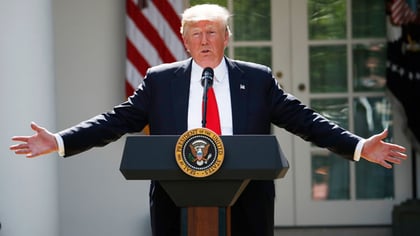Donald Trump’s in trouble and emerging markets may pay the cost, according to some of the world’s largest money managers.
Facing an increasingly grim legal and political landscape, the president is likely to double down on his strategy to distract from domestic concerns by fixing his focus abroad, said John Normand, JPMorgan Chase & Co.’s head of cross-asset fundamental strategy in London. That could escalate his push for higher tariffs on $200 billion in Chinese imports, among other things.
“Overweighting EM broadly isn’t the low-worry hedge to a tortuous impeachment process,” Normand wrote in a note Thursday, adding that he’s “modestly overweight” emerging markets due to their medium-term value.
Trump has repeatedly turned overseas at times of domestic distress. In recent months, the White House has slapped sanctions on countries from Venezuela to Turkey, just as investigations into Russian election meddling and hush-money payments deepened. A tit-for-tat with China on trade also intensified. South Africa’s rand led emerging-market losses Thursday after Trump leaped into the nation’s heated land reform debate.
“The motive behind Trump’s actions is sometimes hard to understand, but looking tough to the world is something that goes well with his America First policy and bodes well to his constituency,” said Pablo Goldberg, a money manager at BlackRock Inc. in New York.









 August 23, 2018 at 04:47 PM
August 23, 2018 at 04:47 PM











